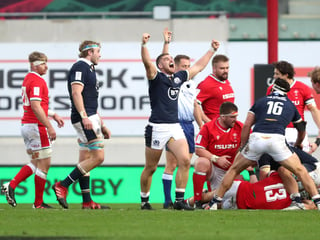Scotland v Wales: The Scottish pack is fast, disciplined and efficient and should take control


The set scrum was good. The lineout was good. The defence was good. The kicking from hand was good. Not even one penalty was conceded at the breakdown where our “scavengers” were as judicious as they were quick.
England have been much criticised by their own press and supporters, and certainly with reason. Yet in defeat it’s easy to forget, as we ourselves have all too often forgotten, that there are two teams on the field and sometimes the defeated one has played only as well as its opponents have permitted. There may not have been that much life in the English XV at Twickenham, but such life as they had was squeezed out of them. Their half-backs kicked a lot, but their kicks gave little trouble to the Scots, while Stuart Hogg and Finn Russell both asked awkward questions when they put boot to ball.
Advertisement
Hide AdAdvertisement
Hide AdNow Wales come north with a win under their belt too. Neither coach can field the team that won last weekend, though it’s fair to say that Wayne Pivac has had to cope with a longer injury list than Gregor Townsend. That said, though Wales played with great resolution against Ireland and scored two good tries, they enjoyed, even needed, a bit more luck than Scotland did at Twickenham. They played for an hour against 14 men after Peter O’Mahony’s reckless charge into a ruck rightly resulted in a red card; and if Billy Burns hadn’t missed touch with his injury-time penalty and Ireland had had a lineout within ten metres of the Welsh try-line… who knows? It is at least possible, and even probable, that the run of Welsh defeats in the Six Nations would have continued.
Nevertheless, they won, and, even depleted by injuries, they come to Murrayfield with a XV at least half of who have the experience of winning a Grand Slam and playing Test match rugby for the Lions. As, back in the amateur days, John Rutherford used to say whenever I suggested possible changes in the Scotland team, “there’s no substitute for experience”.
Moreover it’s hard not to conclude that the Covid-compelled ban on spectators means that home advantage isn’t what it usually is. We’ve seen this in both football and rugby. We beat Wales in the last delayed match of the 2020 tournament in an empty Parc y Scarlets, and if Ireland had snatched that last-minute win in Cardiff, all three matches in the first round of this year’s Six Nations would have ended in a home defeat.
However, another old adage remains true: forwards win matches, backs determine by how much. If the Scottish pack are as fast, disciplined and efficient as they were at Twickenham, they can – indeed should – take control of the game as they did there. My one criticism of the forwards is that they tend to retain the ball deep in the opposition 22, attempting short-range surges, even after the early and best chances of scoring by such means have gone, and it would be better to trust the backs to finish the job.
Scotland gave away only six penalties at Twickenham, only one of which might fairly be called stupid. If they are as self-disciplined today, our chance of victory is much greater.
If they aren’t, well, goal-kicking is the one area of the game where Wales would seem to have a clear advantage, Leigh Halfpenny and Dan Biggar being far more reliable goal-kickers than either Russell or Hogg, neither of whom kicks regularly for his club. Finn actually became a pretty reliable goal-kicker when he had that responsibility, but now it is almost always his scrum-half partner at Racing 92, Teddy Iribaren, who is entrusted with place-kicks. All the more important to score tries if your opponents have better goal-kickers.
Talking of tries, I was sorry to see Sam Warburton, former Wales and Lions captain, adding his voice to those who would like to see Italy face relegation from the Six Nations. “What do they bring to it?” critics ask. Well, apart from the pleasures of a trip to Rome when this becomes permissible again, just at present Italy bring us more adventurous and entertaining back play than any Six Nations team except France.
It’s a rare match now in which they don’t score a couple of exhilarating tries – and that’s more than can be said for some of their rivals. Their defence is poor, and they lack strength in depth, so that they fade in the last quarter when replacements from both teams flood the field. But this present young Italian side is fun to watch, and fun is, after all, something we all look for from a match.
A message from the Editor:
Get a year of unlimited access to all The Scotsman's sport coverage without the need for a full subscription. Expert analysis of the biggest games, exclusive interviews, live blogs, transfer news and 70 per cent fewer ads on Scotsman.com - all for less than £1 a week. Subscribe to us today
Comments
Want to join the conversation? Please or to comment on this article.
